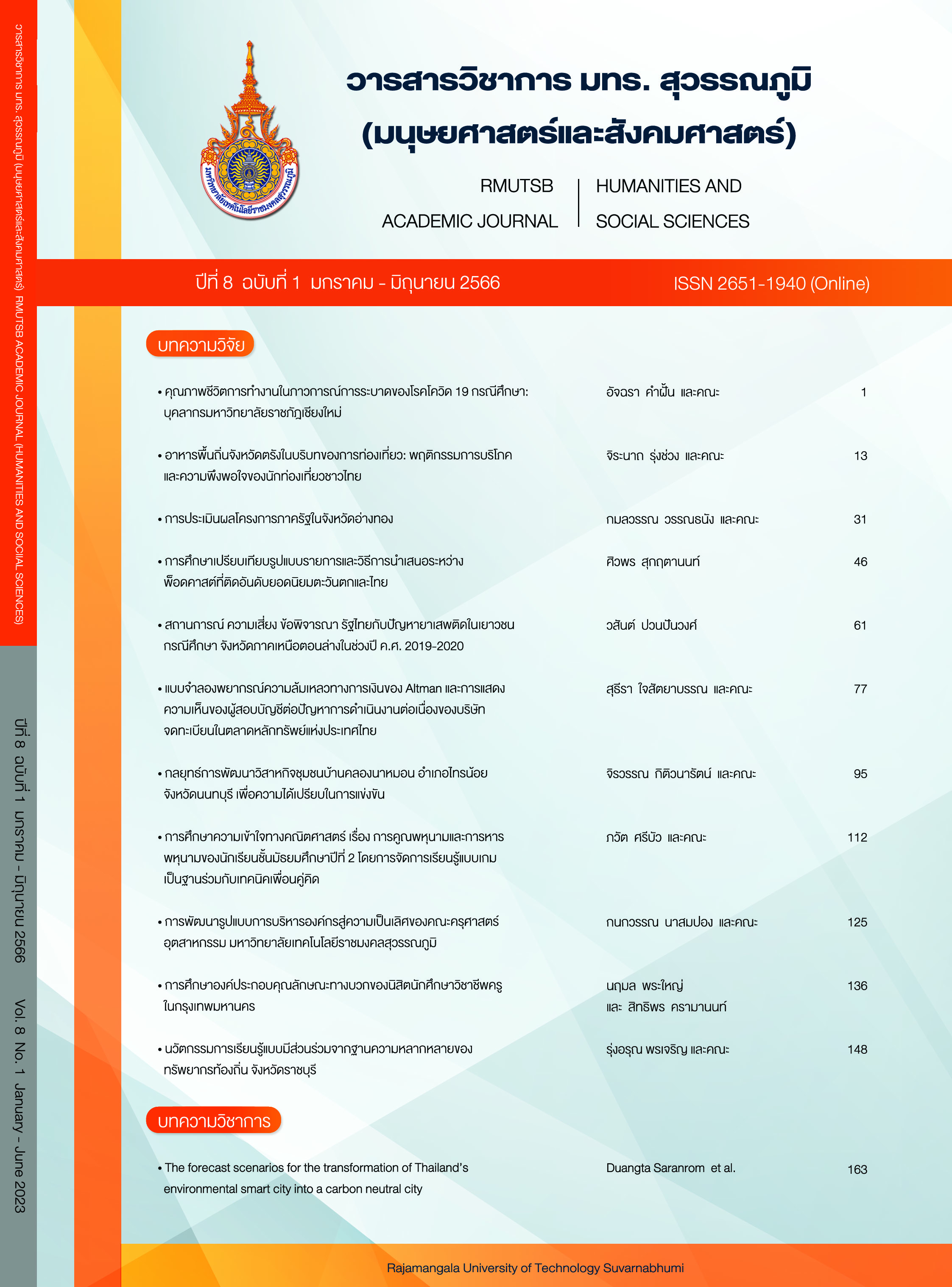Study of mathematical understanding on multiplication and division of polynomial for Mathayomsuksa 2 students using game based learning with think pair share technique
Main Article Content
Abstract
This research aimed to 1) study students’ mathematical understanding levels on multiplication and division of polynomial for Mathayomsuksa 2 Students using Game Based Learning with Think Pair Share technique and 2) compare mathematical understanding of multiplication and division of polynomial for Mathayomsuksa 2 Students after using Game Based Learning with Think Pair Share technique at the 70 percent of criterion. The sample group of this research was from 43 students in Mathayomsuksa 2 of the first semester of the academic year 2022, Benchamatheputhit-Phetchaburi school. The sample was derived by Cluster random sampling technique. The research instrument were the lesson plan, the mathematical understanding test, scoring criteria, and the criteria for interpreting the mathematical understanding levels. The collected data were analyzed using the frequency, the percentage, the arithmetic means, the standard deviation, and one sample t-test statistics.
The results were as followed; 1) Students’ mathematical understanding levels on multiplication and division of polynomial for Mathayomsuksa 2 Students using Game Based Learning with Think Pair Share technique were at Primitive level 2.32%, Doing level 11.63%, Process level 48.84%, and Object level 37.21%. 2) Mathematical understanding on multiplication and division of polynomial for Mathayomsuksa 2 Students after using Game Based Learning with Think Pair Share technique were higher than 70 percent of criterion at 0.05 level of significance.
Article Details

This work is licensed under a Creative Commons Attribution-NonCommercial-NoDerivatives 4.0 International License.
References
Beka, A. (2017). The impact of games in understanding mathematical concepts to preschool children. Journal of Educational and Social Research, 7(1), 187-194.
Chin, C. (1997). Promoting higher cognitive learning in science through a problem-solving approach. National Institute of Education (Singapore), 1997(1), 7-11.
Compakea, J. (2020). The development of problem solving skill in mathematics on Prism and Cylinder using Think-Pair-Share with Mathematics Game of Mathayomsuksa 2 Students (Master’s thesis). Silpakorn University, Bangkok.
Dencha, T., Sangaroon, K., Inprasitha, M., & Srichompoo, S. (2015). Students’ mathematical understanding levels on exponent in classroom using taught by open approach. Veridian E-Journal, 8(2), 1719-1734.
Diamond, A. (2015). Game based learning: Definition and examples. Retrieved 22 February 2022, from https://study.com/academy/lesson/game-based-learning-definition-and-examples.html#:~:text=Game%2Dbased%20learning%20is%20composed,engaging%2C%20and
%20offers%20immediate%20rewards.
Hanmontri, T. (2020). A development of learning activities by using collaborative learning and think-pair-share technique to promote Mathematics problem solving ability for Interest and the value of money in Matthayomsuksa 5 students (Master’s thesis). Mahasarakham University, Maha Sarakham.
Institute for the Promotion of Teaching Science and Technology. (2008). Mathematical skills and Mathematical process (2nd ed.). Bangkok:
S Charoen Printing.
Intasara, W. (2019). Game based learning: The latest trend education. Retrieved 27 December 2021, from https://wbsc.dusit.ac.th/pluginfile.php/534/mod_forum/attachment/4320/GBL%20DOC.pdf.
Juakwon, P. (2017). Using problem-based learning to promote grade 10 Students’ mathematical understanding (Master’s thesis). Chiang Mai University, Chiang Mai.
Khammanee, T. (2011). Pedagogical sciences: Knowledge for effective organization of learning processes (25th ed.). Bangkok: Chulalongkorn University Press.
Makanong, A. (2003). Mathematics: teaching and learning. Bangkok: Office of Academic Resources Chulalongkorn University.
Ministry of Education. (2008). Basic education core curriculum B.E. 2551 (A.D. 2008). Bangkok: The Agricultural Co-operative Federation of Thailand.
Moonkum, S. (2006). Conceptual thinking. (3rd ed.). Bangkok: Parbpim.
Nakasan, N., & Nakasan, C. (2016). Game: Innovation for creative education. Romrhruek Journal, 34(3), 159-182.
Padungprasert, R., Maneewong, W., Pongsiri, W., & Chaowatthanakun, K. (2022). A study of learning achievement on application of conversion of 8th grade students by learning management based on the STEM education together with game-based teaching methods. RMUTSB Academic Journal (Humanities and social sciences), 7(2), 180-195.
Pandach, T. (2018). Developing the upper secondary school students’ mole and chemical formula concepts using game-based learning (Master’s thesis). Chulalongkorn University, Bangkok.
Ruangsawat, P. (2019). Development of learning management model based on constructivist theory to promote mathematical understanding in probability of Mathayomsuksa 5 Students (Master’s thesis). Thaksin University, SongKhla.
Sihombing, Y., Simamora, R., & Dewi, S. (2021). The effect of think pair share on understanding mathematical concepts in junior High School. In M. Muhammad, & Saefurrohman (Eds.), Book of Proceedings “Pedagogical Innovations in Education” (pp. 77-86). Jawa Tengah: UM Purwokerto Press.
Silver, E. A., Mesa, V. M., Morris, K. A., Star, J. R., & Benken, B. M. (2009). Teaching mathematics for understanding: An analysis of lessons submitted by teachers seeking NBPTS certification. American Educational Research Journal, 46(2), 501-531.
Suksiri, S. (2007). The study of effectiveness of game based learning approach (Master’s thesis). Bangkok: National Institute of Development Administration.
Tanyarattanasrisakul, M. (2020). Curriculum development of “M30295 mathematical project” for Mathayomsuksa 6 students through active learning with self-directed learning. Humanities and social sciences, 5(2), 249-268.
Thanompong, N. (2019). A study of the academic responsibility of the Mathayomsuksa 3 Students using Cooperative Learning (Think Pair Share Technique) (research report). Trat: Khiriwet Rattanupatham School.
Toeihom, A. (2020). Effect of cooperative learning using Think-Pair-Share techniques for reasoning ability and mathematics achievements involving multiplications and divisions of Grade 4 Students (Master’s thesis). Valaya Alongkorn Rajabhat University, Pathum Thani.


